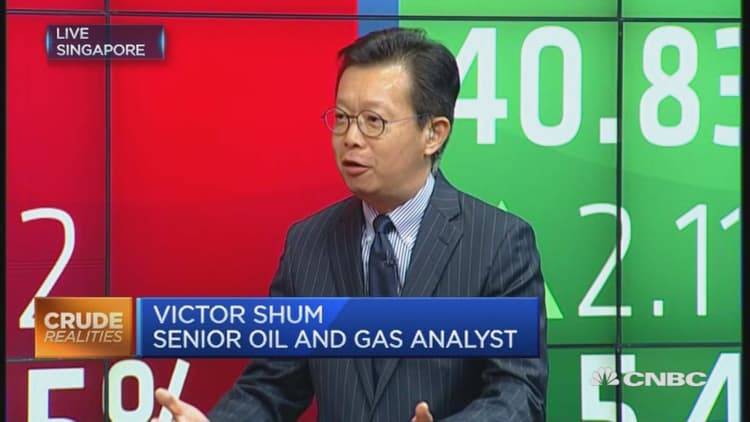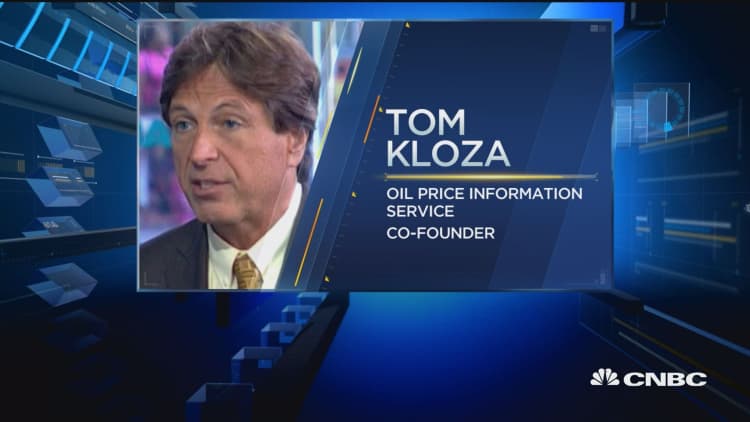


Predictions of an oil rally to $50 a barrel has markets excited, but IHS's top oil analyst cautions that the commodity hasn't done rebalancing yet.
Oil prices jumped on Monday, with global benchmark crude breaking above the vital $40-a-barrel level, a 50 percent price rise from January when prices hit a near 13-year low.
Prices were buoyed by reports that Latin American crude producers would this Friday in Ecuador, sparking hopes of price-supportive measures.
Meanwhile, influential New York-based oil industry consultancy PIRA told Reuters that major OPEC producers were discussing a new price equilibrium of around $50 a barrel - a report that also helped push oil higher.
Oil prices slipped in Asian trade on Tuesday, with U.S. benchmark WTI light, sweet crude down over 1 percent above $37 a barrel while Brent also down over 1 percent but still above $40 a barrel.
OPEC producers aren't the only ones talking $50 oil.
RBC Capital Markets' head of global commodities strategies Helima Croft told CNBC's "Power Lunch" overnight that the oil market's "psychology has changed."
"Everyone is thinking about now the recovery to $50," she said, citing a realization by OPEC producers that they needed $50 oil to avoid credit ratings downgrades and further austerity measures.
In a report last Thursday, Morgan Stanley analysts also forecast $50 a barrel oil by May, due to less bearish data and the fact that current low prices were unsustainable for most producers.
In support of its argument, Morgan Stanley pointed out that markets "did not collapse" even though Iran started shipping 500,000 more barrels a day in February, taking its exports up to 1.5 million barrels a day, according to tanker-tracking reports.
But IHS' senior oil and gas analyst Victor Shum told CNBC's "Squawk Box" on Tuesday that a move to $50 a barrel by May was too fast, too soon.
Calling even $40-a-barrel Brent "premature," Shum said U.S. production needed to fall meaningfully for a longer period of time to spur sustainable gains in oil prices, he said. The analyst expects oil to approach $50 only by the end of the year.
Although U.S. onshore production dropped by 160,000 barrels a day from November to December, the global supply surplus was still more one million barrels a day, on top of a significant inventory overhang, Shum said.
"Nothing really much has changed fundamentally in the oil market … the current price rally is premature and it may reverse in the coming days," he added.
A price rally now would only help support oil production, the last thing the market needed in an oversupplied market, he warned.
"With Brent at $40 … that's going stop the decline in U.S. onshore production; that's going to prolong the rebalancing of the oil market that is going on today," Shum said.
On the demand side, oil demand growth was likely to come in at 1.2 million barrels a day this year, down from 1.7 million barrels a day last year amid economic headwinds in China, the expert said.
As for talk of a producer-wide output freeze after February's Russia-OPEC meeting, it bolstered market sentiment but was unlikely to be effective because Iran would not join in on a freeze and OPEC kingpin Saudi Arabia had already said categorically that it would not take part in any production cut, he said.
"There is hope in the market that the talk of a freeze is the first step that will lead to a production cut [but] that's really wishful thinking," said Shum.
Morgan Stanley's analysts were more optimistic of a meeting of minds.
"We think it matters a great deal that the Saudis and Russians and Iraqis and Iranians are talking. They may not be on the same page yet. But they've all opened a book and the title of that book is, to paraphrase Saudi oil minister Ali al-Naimi, 'stabilizing markets'."



